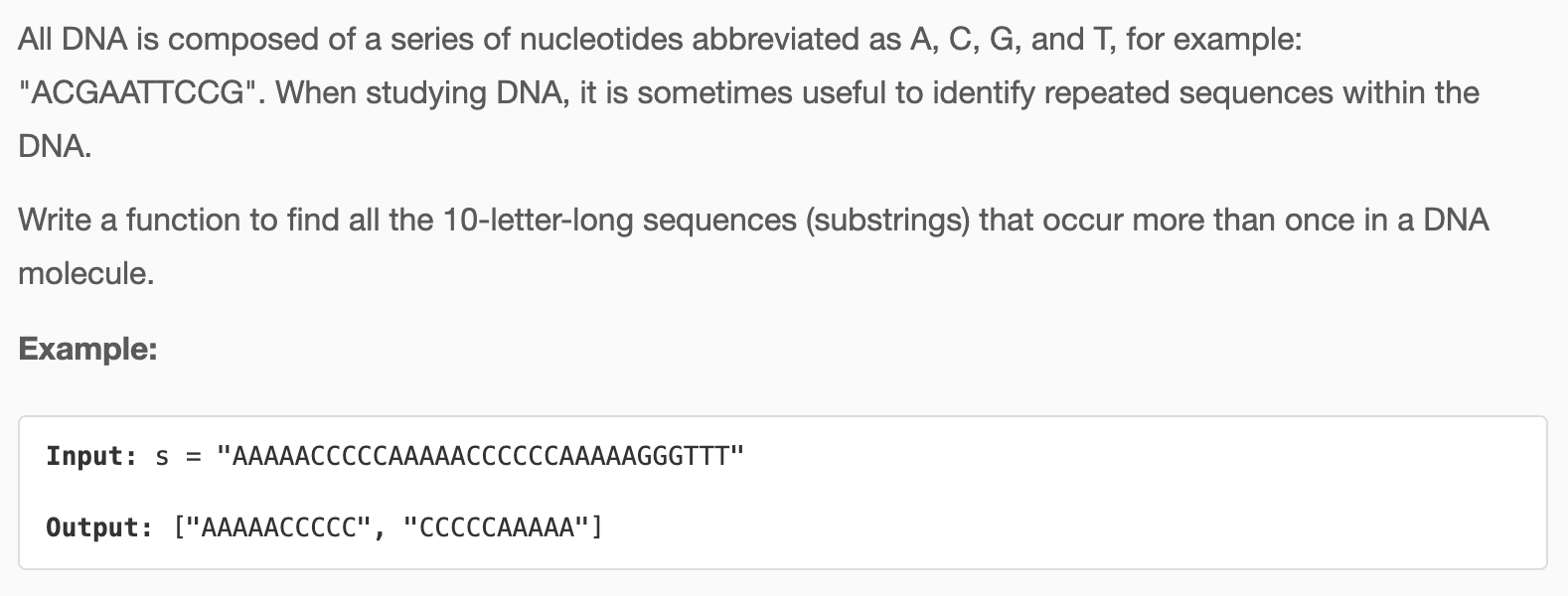Repeated DNA Sequence
franklinqin0 Hash TableBitTwo Pointers

# Solution
All the following 3 solutions have the same complexities:
Complexity
time: for
space: for
# Sliding Window & HashSet
Move a sliding window of length L == 10 along the string of length n. In the sliding window, if the seqence is not seen yet, add to seen; otherwise, add to output. At the end of for loop, return output.
def findRepeatedDnaSequences(self, s: str) -> List[str]:
L, n = 10, len(s)
seen, output = set(), set()
for i in range(n-L+1):
seq = s[i:i+L]
if seq not in seen:
seen.add(seq)
else:
output.add(seq)
return output
1
2
3
4
5
6
7
8
9
10
11
2
3
4
5
6
7
8
9
10
11
# RK
def findRepeatedDnaSequences(self, s: str) -> List[str]:
L, n = 10, len(s)
# edge case
if n < L:
return []
seen, res = set(), set()
dct = {'A': 0, 'C': 1, 'G': 2, 'T': 3}
hash_s = 0
s_to_int = lambda i: dct[s[i]]
base = 4
mod = 10**9 + 7
power = pow(base, L, mod)
# compute hash of s[0:L] and add to seen
for i in range(L):
hash_s = hash_s*base + s_to_int(i)
seen.add(hash_s)
for i in range(1, n-L+1):
# compute current hash by multiplying base, subtracting prev*power and adding next
hash_s = hash_s*base - s_to_int(i-1)*power + s_to_int(i+L-1)
if hash_s in seen:
res.add(s[i:i+L])
else:
seen.add(hash_s)
return res
1
2
3
4
5
6
7
8
9
10
11
12
13
14
15
16
17
18
19
20
21
22
23
24
25
26
2
3
4
5
6
7
8
9
10
11
12
13
14
15
16
17
18
19
20
21
22
23
24
25
26
# Bit Manipulation
Similar to RK, we encode the strings in terms of bits, i.e., A as 00, C as 01, G as 10, and T as 11. We then use bitmask to store encoding of current chars in sliding window into seen if not seen before, and add to output if seen.
def findRepeatedDnaSequences(self, s: str) -> List[str]:
L, n = 10, len(s)
if n <= L:
return []
# convert string to the array of 2-bits integers:
# 00_2, 01_2, 10_2 or 11_2
to_int = {'A': 0, 'C': 1, 'G': 2, 'T': 3}
nums = [to_int.get(s[i]) for i in range(n)]
bitmask = 0
seen, output = set(), set()
# iterate over all sequences of length L
for start in range(n - L + 1):
# compute bitmask of the sequence in O(1) time
if start != 0:
# left shift to free the last 2 bit
bitmask <<= 2
# add a new 2-bits number in the last two bits
bitmask |= nums[start + L - 1]
# unset first two bits: 2L-bit and (2L + 1)-bit
bitmask &= ~(3 << 2 * L)
# compute bitmask of the first sequence in O(L) time
else:
for i in range(L):
bitmask <<= 2
bitmask |= nums[i]
if bitmask in seen:
output.add(s[start:start + L])
seen.add(bitmask)
return output
1
2
3
4
5
6
7
8
9
10
11
12
13
14
15
16
17
18
19
20
21
22
23
24
25
26
27
28
29
30
31
2
3
4
5
6
7
8
9
10
11
12
13
14
15
16
17
18
19
20
21
22
23
24
25
26
27
28
29
30
31